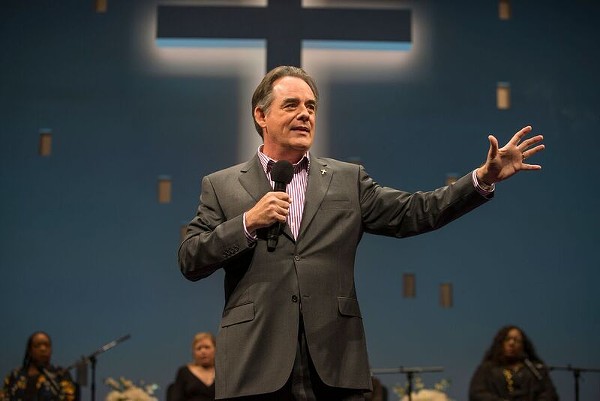Crisis Comes to the Megachurch in Steppenwolf’s the Christians
By Albert Williams
Lucas Hnath's intriguing 2014 drama The Christians, now receiving its Chicago premiere in a finely acted production at Steppenwolf Theatre, is unlike any play I've ever seen about religion. There's no nun boldly overstepping her authority to expose a suspected pedophile priest; no charismatic hypocritical preacher bilking the gullible faithful; no philandering phonies or self-hating homos, preaching traditional family values while pursuing their own illicit lusts. Instead, The Christians concerns a basic question that might seem better suited to a scholarly lecture: Is God's love for humanity so great that it encompasses everyone, not just Christians? This is the question that the play's protagonist, Pastor Paul, proposes to his flock on the particular Sunday morning on which Hnath's 80-minute one-act takes place. Paul is the leader of a modern American megachurch, which he has built over two decades from a small storefront into a sprawling complex thanks to the prayers—and donations—of his thousands of followers. Now, having paid off the debt incurred erecting this magnificent edifice, Paul preaches a sermon of "radical change." Speaking softly and humbly into his handheld microphone, Paul explains that after having a heart-to-heart talk with the heavenly father, he now sees that Christians must break down barriers separating them from the rest of a world torn by violence. He recounts the story of a non-Christian boy in an unnamed foreign country who gave his own life to save his sister from a terrorist attack. Should that boy not receive salvation just because he hasn't been baptized as a Christian? Should belief in the divinity of Jesus determine whether one goes to heaven or to hell? And then Paul drops the other shoe: there is no hell. Paul—played with wisdom, humility, and gravitas by ensemble member Tom Irwin—is both the protagonist and narrator of the action that his startling sermon triggers as, gradually, the church he created slips away from him. For it seems that his ecstatic message—God's love is for everyone, even those who don't believe in him, even for Hitler—is not such "good news" for folks who have invested a lot of emotion, effort, and money in the belief that their path to salvation is the only sure one. This process is played out as a series of dialogues between Paul and his passionate young associate pastor Joshua (Glenn Davis), his supportive but perplexed church elder Jay (Robert Breuler), a confused congregant (Jacqueline Williams), and his wife, Elizabeth (Shannon Cochran), who finds herself torn between her love and admiration for her husband and her inability to accept his message. Directed by K. Todd Freeman, The Christians is a gently compelling work of theatrical storytelling. It's performed as a church service, with Paul and the other characters' dialogues framed by musical interludes, as members of the church's five-person gospel choir deliver hymns of rapturous joy and ballads of mournful doubt before gradually moving on to a church that offers them the benevolent but authoritarian absolutism that so many religionists seek. Hnath, who spent his own childhood as a member of an Assemblies of God megachurch in Orlando, Florida, treats this story of schism with earnest and informed objectivity. There are no caricatures here; all sides of the issue are expressed intelligently and honestly, and are heard respectfully and compassionately. And by focusing on a core doctrinal question—the divinity of Jesus—The Christians avoids getting bogged down in political debates, allowing the audience to zero in on the general theme of how Paul's conscience-driven decision impacts his family, friends, and followers. But this approach also allows Hnath to evade the story's urgent implications for a crisis facing all people of all faiths. The power of religion has historically been based on believers' insistence that their version of God is the "true" one. Can humanity put aside these differences when faced with global warming, a pending catastrophe of, as they say, biblical proportions??
|
.
Any original material on these pages is copyright © BishopAccountability.org 2004. Reproduce freely with attribution.
